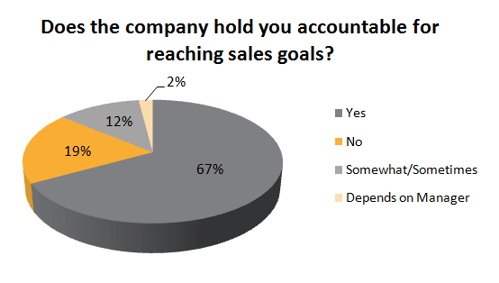Goal setting is helpful for managers and employees. Managers have multiple opportunities to provide employees with feedback during this process, and they are able to identify their employees’ strengths and weaknesses. Employees can see how their individual contributions affect and support their company’s bottom line when they begin making goals. If goal setting is done correctly, managers have measurable results to verify that employees met or did not meet their assigned goals, which is helpful when determining rewards and future career paths.
Goal Setting At A Glance:
- When asked about work related goals being recorded by his/her manager, 73% answered affirmatively while 26% of the responses were negative – stating that they did not have work-related goals that were recorded with their manager/supervisor.
- When asked to rank whether or not their goals were reachable, 70% responded affirmatively by selecting “easy to beat,” “beatable,” or “reachable” and 30% responded negatively by selecting “impossible to reach” or “hard to reach.”
- Similarly, when asked, “Does the company hold you accountable for reaching goals?” 67% responded affirmatively by selecting “Yes,” 14% responded with “Somewhat/Sometimes” or “Depends on Manager,” and 19% responded negatively by selecting “No.”
IN A NUTSHELL: Goals are important and everyone needs them, regardless of one’s role or level within an organization and without accountability, goals are useless.
Accountability is one of the most misused terms in business. Accountability is the synchronicity of effort, activity, and energy around different goals, milestones, and markers. When in alignment, and done in an authentic way, accountability helps a company grow regardless. The type of accountability we teach most at entreQuest is the idea of an adult-to-adult relationship where people have candid conversations. Candid conversations allow people the ability to be heard, feel valued, and give and receive feedback to one another.
Appropriate goal setting and accountability can motivate employees to produce remarkable work. As a leader, you should help your direct reports create suitable goals for their positions. Assisting your team with goal setting will also keep you informed about the personal and professional interests of your team to better prepare you to help them stay on course.
In order to hold your employees accountable to their goals, it’s important to first work with them to set their goals and then work with them toward each goal. To get started, we recommend answering these three simple questions:
1. Do They Align With Company Goals?
Your employee’s goals must align with your company goals. Be sure to remind your team that because their goals are linked to company goals they are directly affecting the company’s success and growth. You may have several goals that they would like your employees to accomplish, but don’t forget to consider the goals your employees would like to attain. Simply ask what they would like to achieve, and if their objectives are appropriate, help them create action plans. Your employees are more likely to be engaged in their work when they see how their efforts benefit the company, as well as, themselves. All goals should support the overall company mission, so strive for quality instead of quantity when establishing them.
2. Can They Reach Them?
Unrealistic goals benefit no one. In order for your employees to be happy and produce good work to help your company grow, their goals need to be both challenging and attainable. Goals that are too high or impossible to reach will leave your employees feeling helpless. Keep their morale high and stress low by tailoring goals to their skill set, position, and growth potential. Work with your team to strategize ways to accomplish their goals, help them break large goals into several projects, and set deadlines for each one. The best way to ensure goals are attainable and challenging is to make them SMART (specific, measurable, attainable, recorded, and within a time-frame).
3. Are You Present?
As illustrated through our data, goals are often unmet because of a lack of supervision and accountability from managers. This problem is easily avoidable if you and your employees agree to meet and discuss the progress of each goal frequently (see our blog on the importance of performance reviews and team meetings for more). Micromanaging is not necessary, but receiving consistent updates will help your keep your team on track, as well as, help to identify and work through potential obstacles.
At eQ, one of our core values is to keep our word. As we live through this value every day, we strive to make realistic commitments, follow-through on our promises, and display integrity and accountability to the extreme. We know what it takes to determine the right goal for ourselves and our employees to ensure it is not only attainable and challenging, but also contributes directly to the growth and success of the company. If you’re interested in learning more, contact us today!
Joe Mechlinski is the CEO of entreQuest and has partnered with countless leaders to effectively improve their team’s performance, their clients’ experience, and their company’s profits.








